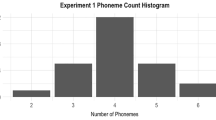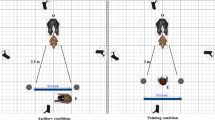Abstract
Like humans, canine companions often find themselves in noisy environments, and are expected to respond to human speech despite potential distractors. Such environments pose particular problems for young children, who have limited linguistic knowledge. Here, we examined whether dogs show similar difficulties. We found that dogs prefer their name to a stress-matched foil in quiet conditions, despite hearing it spoken by a novel talker. They continued to prefer their name in the presence of multitalker human speech babble at signal-to-noise levels as low as 0 dB, when their name was the same intensity as the foil. This surpasses the performance of 1-year-old infants, who fail to prefer their name to a foil at 0 dB (Newman in Dev Psychol 41(2):352–362, 2005). Overall, we find better performance at name recognition in dogs that were trained to do tasks for humans, like service dogs, search-and-rescue dogs, and explosives detection dogs. These dogs were of several different breeds, and their tasks were widely different from one another. This suggests that their superior performance may be due to generally more training and better attention. In summary, these results demonstrate that dogs can recognize their name even in relatively difficult levels of multitalker babble, and that dogs who work with humans are especially adept at name recognition in comparison with companion dogs. Future studies will explore the effect of different types of background noise on word recognition in dogs.




Similar content being viewed by others
References
Albuquerque N, Guo K, Wilkinson A, Savalli C, Otta E, Mills D (2016) Dogs recognize dog and human emotions. Biol Lett 12(1):20150883. https://doi.org/10.1098/rsbl.2015.0883
Albuquerque N, Guo K, Wilkinson A, Resende B, Mills DS (2018) Mouth-licking by dogs as a response to emotional stimuli. Behav Process 146: 42–45. https://doi.org/10.1016/j.beproc.2017.11.006
Andics A, Gácsi M, Faragó T, Kis A, Miklósi Á (2014) Voice-sensitive regions in the dog and human brain are revealed by comparative fMRI. Curr Biol 24(5):574–578. https://doi.org/10.1016/j.cub.2014.01.058
Andics A, Gábor A, Gácsi M, Faragó T, Szabó D, Miklósi Á (2016) Neural mechanisms for lexical processing in dogs. Science 353(6303):1030–1032. https://doi.org/10.1126/science.aaf3777
Appleyard D, Lintell M (1972) The environmental quality of city streets: the residents’ viewpoint. J Am Plan Assoc 38(2):84–101. https://doi.org/10.1080/01944367208977410
Ben-Aderet T, Gallego-Abenza M, Reby D, Mathevon N (2017) Dog-directed speech: why do we use it and do dogs pay attention to it? Proc R Soc B Biol Sci 284(1846):20162429. https://doi.org/10.1098/rspb.2016.2429
Cuaya LV, Hernandez-Perez R, Concha L (2016) Our faces in the dog’s brain: functional imaging reveals temporal cortex activation during perception of human faces. PloS ONE 11(3):e0149431. https://doi.org/10.1371/journal.pone.0149431
Dorey NR, Udell MAR, Wynne CDL (2009) Breed differences in dogs sensitivity to human points: a meta-analysis. Behav Process 81(3):409–415. https://doi.org/10.1016/j.beproc.2009.03.011
Erickson LC, Newman RS (2017) Influences of background noise on infants and children. Curr Dir Psychol Sci 26(5):451–457. https://doi.org/10.1177/0963721417709087
Fugazza C, Miklósi Á (2014) Deferred imitation and declarative memory in domestic dogs. Anim Cogn 17(2):237–247. https://doi.org/10.1007/s10071-013-0656-5
Kaminski J, Call J, Fischer J (2004) Word learning in a domestic dog: evidence for “fast mapping. Science 304(5677):1682–1683. https://doi.org/10.1126/science.1097859
Marshall-Pescini S, Valsecchi P, Petak I, Accorsi PA, Previde EP (2008) Does training make you smarter? The effects of training on dogs’ performance (Canis familiaris) in a problem solving task. Behav Process 78(3):449–454. https://doi.org/10.1016/j.beproc.2008.02.022
Marshall-Pescini S, Passalacqua C, Barnard S, Valsecchi P, Prato-Previde E (2009) Agility and search and rescue training differently affects pet dogs’ behaviour in socio-cognitive tasks. Behav Process 81(3):416–422. https://doi.org/10.1016/j.beproc.2009.03.015
McAlexander TP, Gershon RRM, Neitzel RL (2015) Street-level noise in an urban setting: assessment and contribution to personal exposure. Environ Health Global Access Sci Sour 14(1):18. https://doi.org/10.1186/s12940-015-0006-y
Mckinley J, Sambrook TD (2000) Use of human-given cues by domestic dogs (Canis familiaris) and horses (Equus caballus). Anim Cogn 3:13–22. https://doi.org/10.1007/s100710050046
Merola I, Prato-Previde E, Marshall-Pescini S (2012) Dogs’ social referencing towards owners and strangers. PLoS ONE 7(10):e47653. https://doi.org/10.1371/journal.pone.0047653
Newman RS (2005) The cocktail party effect in infants revisited: listening to one’s name in noise. Dev Psychol 41(2):352–362. https://doi.org/10.1037/0012-1649.41.2.352
Newman RS (2009) Infants’ listening in multitalker environments: Effect of the number of background talkers. Atten Percept Psychophys 71(4):822–836. https://doi.org/10.3758/APP.71.4.822
Newman RS, Jusczyk PW (1996) The cocktail party effect in infants. Percept Psychophys 58(8):1145–1156. https://doi.org/10.3758/BF03207548
Nozza RJ, Rossman RN, Bond LC, Miller SL (1990) Infant speech-sound discrimination in noise. J Acoust Soc Am 87(1):339–350. https://doi.org/10.1121/1.399301
Nozza RJ, Rossman RN, Bond LC (1991) Infant-adult differences in unmasked thresholds for the discrimination of consonant-vowel syllable pairs. Audiology. https://doi.org/10.3109/00206099109072875
Pilley JW, Reid AK (2011) Border collie comprehends object names as verbal referents. Behav Process 86(2):184–195. https://doi.org/10.1016/j.beproc.2010.11.007
Polka L, Rvachew S, Molnar M (2008) Speech perception by 6- to 8-month-olds in the presence of distracting sounds. Infancy 13(5):421–439. https://doi.org/10.1080/15250000802329297
Racca A, Amadei E, Ligout S, Guo K, Meints K, Mills D (2010) Discrimination of human and dog faces and inversion responses in domestic dogs (Canis familiaris). Anim Cogn 13(3):525–533. https://doi.org/10.1007/s10071-009-0303-3
Rhodes G, Geddes K, Jeffery L, Dziurawiec S, Clark A (2002) Are average and symmetric faces attractive to infants? Discrimination and looking preferences. Perception 31(3):315–321. https://doi.org/10.1068/p3129
Schmidtke J (2016) The bilingual disadvantage in speech understanding in noise is likely a frequency effect related to reduced language exposure. Front Psychol 7:1–15. https://doi.org/10.3389/fpsyg.2016.00678
Soproni K, Miklósi Á, Topál J, Csányi V (2001) Comprehension of human communicative signs in pet dogs (Canis familiaris). J Comp Psychol 115(2):122–126. https://doi.org/10.1037//0735-7036.115.2.122
Thehub SE, Bull D, Schneider BA (1981) Infants’ detection of speech in noise. J Speech Lang Hear Res 24(2):202–206. https://doi.org/10.1044/jshr.2402.202
Werner L (2007) Issues in human auditory development. J Commun Disord 40(4):275–283. https://doi.org/10.1016/j.jcomdis.2007.03.004
West RE, Young RJ (2002) Do domestic dogs show any evidence of being able to count? Anim Cogn 5(3):183–186. https://doi.org/10.1007/s10071-002-0140-0
Wobber V, Hare B, Koler-matznick J, Wrangham R, Tomasello M (2009) Breed differences in domestic dogs’ (Canis familiaris) comprehension of human communicative signals. Interact Stud 10(2):206–224. https://doi.org/10.1075/is.10.2.06wob
Wynn K (1992) Addition and subtraction by human infants. Nature 358(6389):749. https://doi.org/10.1038/358749a0
Funding
This study was not funded by a grant.
Author information
Authors and Affiliations
Corresponding author
Ethics declarations
Conflict of interest
Amritha Mallikarjun, Emily Shroads, and Rochelle S. Newman all declare that they have no conflict of interest.
Ethical statement
All applicable international, national, and institutional guidelines for the care and use of animals were followed. This study was approved by the University of Maryland Institutional Animal Care and Use Committee (approval code: 1034861-6).
Informed consent
Informed consent was obtained from the owners of the dogs in the study. Informed consent was not required from either the speakers that provided readings for our nine-talker background noise, nor the speaker who produced the dogs’ names.
Additional information
Publisher’s Note
Springer Nature remains neutral with regard to jurisdictional claims in published maps and institutional affiliations.
Rights and permissions
About this article
Cite this article
Mallikarjun, A., Shroads, E. & Newman, R.S. The cocktail party effect in the domestic dog (Canis familiaris). Anim Cogn 22, 423–432 (2019). https://doi.org/10.1007/s10071-019-01255-4
Received:
Revised:
Accepted:
Published:
Issue Date:
DOI: https://doi.org/10.1007/s10071-019-01255-4




